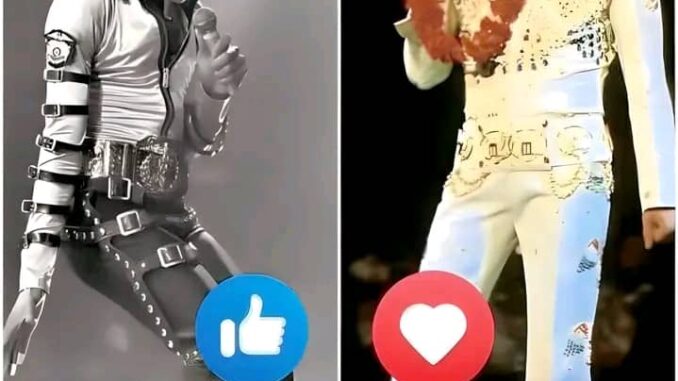
The Titans of Sound: Celebrating the Enduring Legacies of Michael Jackson and Elvis Presley
In the pantheon of musical legends, few figures have managed to carve out as enduring and electrifying a space as Michael Jackson and Elvis Presley. These icons didn’t merely perform; they redefined what it meant to be a star, transforming the cultural landscape with every move, note, and gesture. Their influence persists, echoing through generations and shaping the very fabric of modern music and entertainment.
Michael Jackson: The Electric Phantom of Pop
Michael Jackson, often hailed as the “King of Pop,” was a phenomenon whose artistry transcended boundaries and genres. His career, spanning over four decades, was marked by groundbreaking innovation, unmatched showmanship, and a profound ability to connect emotionally with audiences worldwide.
Jackson’s artistry was a seamless blend of grace and fire. His signature moves — the moonwalk, the spins, the intricate footwork — became emblematic of his genius, transforming the stage into a battleground of beauty and technological innovation. His performance of “Billie Jean” remains one of the most iconic moments in pop history, where the seismic stomp and irresistible groove became a cultural touchstone. The song’s rhythmic pulse, combined with Jackson’s hypnotic dance, exemplified how he turned music into a spectacle of visual and sonic mastery.
Beyond his dance, Jackson’s vocal range and emotional delivery were extraordinary. From the haunting, aching cry of “Earth Song” to the playful exuberance of “Beat It,” his voice danced effortlessly between velvet smoothness and fiery passion. He channelled a kaleidoscope of influences—soul, funk, R&B, and pop—into a distinctive sound that was uniquely his own. His ability to evoke emotion, to tell stories through song and movement, set new standards for performers worldwide.
Jackson did not just perform; he reinvented the stage experience. His music videos—“Thriller,” “Bad,” “Black or White”—became cinematic spectacles, blending storytelling, dance, and visual effects into immersive narratives. His influence on music videos revolutionized how artists connected with their audiences, turning them into mini-movies that heightened the emotional impact of his work.
Throughout his career, Jackson was a pioneer, pushing technological boundaries with innovations like the moonwalk and pioneering digital effects in his videos. His groundbreaking approach helped elevate the artistry of pop music, making every performance an electrifying event that left audiences breathless.
Despite the controversies and challenges that surrounded his life, Michael Jackson’s legacy remains rooted in his capacity to inspire, innovate, and captivate. He was a lightning bolt—powerful, unpredictable, and endlessly iconic—a true titan who turned the stage into a realm of magic and rebellion.
Elvis Presley: The Seismic Force of Rock and Roll
Elvis Presley’s arrival on the music scene was nothing short of a cultural earthquake. Known as the “King of Rock and Roll,” Elvis embodied the rebellious spirit, raw energy, and magnetic charisma that defined a generation. His influence was seismic, reshaping the musical landscape and breaking down societal barriers.
Elvis’s persona was a blend of smooth seduction and wild abandon. His smoldering presence in a leather jacket, his hips gyrating with unrestrained fervor, and his voice—a rich, bluesy baritone—created a seismic shift in popular culture. From the iconic dance moves in “Jailhouse Rock” to the tender crooning of “Can’t Help Falling in Love,” Elvis fused gospel, blues, country, and pop into a sonic cocktail that was as fresh as it was revolutionary.
He didn’t just sing songs; he embodied them. His performances were an amalgamation of rebellion and elegance, a paradox that captivated audiences and challenged social norms. Elvis’s ability to fuse different musical styles into a cohesive, electrifying sound made him a trailblazer—someone who broke free from tradition and redefined what popular music could be.
Elvis’s charisma extended beyond his music. His style—sleek, rebellious, and flamboyant—became a symbol of youthful defiance and individualism. His gyrating hips and provocative stage presence sparked controversy but also inspired countless musicians and performers to embrace their authenticity and push boundaries.
As a cultural phenomenon, Elvis was more than a singer; he was a movement. His influence permeated fashion, attitude, and entertainment, leaving behind a legacy that still resonates today. His music and persona continue to inspire artists across genres, and his impact as a pioneer of modern pop culture remains indelible.
Enduring Legacies
Both Michael Jackson and Elvis Presley are more than just musical icons; they are cultural phenomena whose legacies continue to shape the arts and society. Jackson’s innovative choreography, groundbreaking videos, and genre-blending sound made pop music a canvas for artistic experimentation. Elvis’s rebellious spirit, charismatic presence, and genre fusion created a blueprint for modern rock and roll and popular culture.
Their stories are intertwined with themes of transformation, innovation, and the relentless pursuit of excellence. They demonstrated that music could be a force for change, a vessel for emotion, and a mirror for societal shifts. Their influence is seen in the countless artists who follow in their footsteps—performers who strive to capture their magic, push boundaries, and inspire audiences worldwide.
In the end, Michael Jackson was pop’s electric phantom—graceful, groundbreaking, and endlessly iconic—while Elvis Presley was lightning in a leather jacket—smooth, smoldering, and seismic. Together, they define a legacy that continues to electrify, inspire, and elevate the cultural landscape, illustrating that true legends are eternal, their music forever etched into the fabric of history.
Leave a Reply